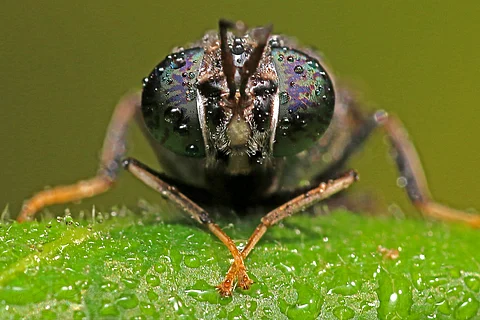

You might love chicken, but do you know what they feed on? Soybean! When soybean is crushed for the extraction of oil, what is left behind is soybean cake, a product that is feed for the poultry industry. But this industry has a lion's share of the world's soybean consumption, 85 per cent to be exact. But growing soybean is hard on Mother Earth. Growing it requires a lot of water and it is intensive on the land it grows on. Did you know that the Amazon Forest Fires of 2019, which had the world up in arms, was caused by humans so that they can grow more soybean? Yes, this is the sorry state of affairs. But this does not mean there is no alternative.
Soldier found
With this belief, Narendra Pasuparthy, CEO of Nandu’s Chicken and Director of the Nanda Group put together a young team to come up with a natural diet for the poultry industry which is easy on the planet. "Since it is natural for chicken to eat worms, we started out by replacing soybean with a natural diet which would still provide them with the necessary protein," says Narendra. And this was not just any larvae, it was the larvae of Black Soldier Flies (BSF). The larvae of this insect eat four times their weight in a day and feed on organic waste, which is currently a burden on our planet. What's more? They are non-pest, non-pathogenic and nor do they bite or sting. They require one per cent of the water that soybean farming requires and they need no harmful fertliser or pesticide either. Impressed yet?
Convinced of their research, the team, led by Founder, COO and biological researcher Mitali Poovayya started Insectifii, India's first commercial-scale insect farming business, last year. They have started with a 4,000 sq ft facility near Banashankari, Bengaluru in which they have an polyhouse. It is temperature and lighting-controlled with sensors and IoT-enabled software that scientifically conspire to create the right environment for the insects. About three or four million eggs are constantly growing at any given time.
BSF and what it does
Mitali thinks it is prudent that we understand the lifecycle of the insect itself and hence, takes us through it. The most interesting trivia about the 2 cm-long insect is that as an adult, it doesn't eat anything, it only drinks water, and lives for four to five days. "That's why it eats all it can when it is a larva," explains Mitali. The insect mates, sniffs out rotten and organic waste and lays eggs there so that as soon as the egg hatches in two to three days and the larva comes out, it has something to feed on. The larva eats all it can in 17 days and enters the pupation stage. It is on day 15 that it is harvested. "They are nature's own waste management solution since they feed purely on organic waste. It's a delight to see them work," shares Narendra to which Mitali whole-heartedly agrees. Once the larva is dehydrated and put through a process which is similar to cold-press, the extraction that it leads to is the insect meal. A byproduct of the extraction is insect oil, which goes back into the meal to up its nutritional value. Thus, a protein-packed substitute for soybean is created for the poultry industry. And it doesn't end here. "We also provide food for aquarium fish under the label Wrigglerz and it's available on Amazon. The oil can also be used in soaps," shares Mitali, who has an MSc in Neurobiology with a Minor in Sustainability from the University of Amsterdam. Even the scales, which the insect sheds after it breaks out of its pupa-like outer body, is a biopolymer and can be used as an alternative to plastic.
So, the aim of Insectifii is to slowly and steadily, reduce the burden of the poultry industry on soybean and ensure that the world wakes up to the possibilities of these insects.
For more on them, check out insectifii.com
